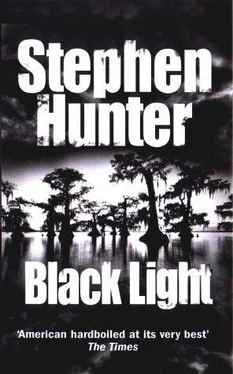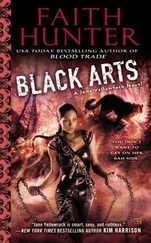Stephen Hunter - Black Light
Здесь есть возможность читать онлайн «Stephen Hunter - Black Light» весь текст электронной книги совершенно бесплатно (целиком полную версию без сокращений). В некоторых случаях можно слушать аудио, скачать через торрент в формате fb2 и присутствует краткое содержание. Год выпуска: 1996, ISBN: 1996, Издательство: Island Books, Жанр: Триллер, на английском языке. Описание произведения, (предисловие) а так же отзывы посетителей доступны на портале библиотеки ЛибКат.
- Название:Black Light
- Автор:
- Издательство:Island Books
- Жанр:
- Год:1996
- ISBN:0-385-48042-3
- Рейтинг книги:3 / 5. Голосов: 1
-
Избранное:Добавить в избранное
- Отзывы:
-
Ваша оценка:
- 60
- 1
- 2
- 3
- 4
- 5
Black Light: краткое содержание, описание и аннотация
Предлагаем к чтению аннотацию, описание, краткое содержание или предисловие (зависит от того, что написал сам автор книги «Black Light»). Если вы не нашли необходимую информацию о книге — напишите в комментариях, мы постараемся отыскать её.
Black Light — читать онлайн бесплатно полную книгу (весь текст) целиком
Ниже представлен текст книги, разбитый по страницам. Система сохранения места последней прочитанной страницы, позволяет с удобством читать онлайн бесплатно книгу «Black Light», без необходимости каждый раз заново искать на чём Вы остановились. Поставьте закладку, и сможете в любой момент перейти на страницу, на которой закончили чтение.
Интервал:
Закладка:
“Damn!” said Bob. “I knew the court records were lost but I was hoping maybe the sheriff’s records were different. Damn!”
“I’m real sorry.”
“Duane, don’t you fret on it. So far we got pretty much a big zero. With the body lost and no cemetery records, the whole damn thing is falling apart on us. We just may have to hang it up.”
“Okay, I just wanted to tell y’all.”
He gave each man a hearty smile, then backed out.
They waited until they heard the car pull out.
“Now, where were we?” Bob asked.
“You were saying that if it was kids who messed up the tombstones we were screwed. On the other hand …”
“On the other hand, if just for the hell of it we figure someone did this on purpose, then don’t it follow only two tombstones were exchanged?”
“Yes.”
“And we know the wrong one belonged to a twenty-five-year-old fellow killed in the Civil War?”
“I got it, I got it. We try and find records—in the courthouse, dammit, burned again, no, no, the historical society—on deaths in Polk County during the Civil War. Maybe we can find the names of the young men who fit that category. That would cut way down on the possible alternative grave sites. But what—excavate ten or twenty of them? I don’t—”
But Bob was fishing through the familiar manila folder of clippings and soon enough produced the front page of the Southwest Times Record , July 26, 1955.
HERO TROOPER BURIED, it read.
Under a spreading elm, on rolling fields filled with trees, a group of mourners stood, somber people putting a good man into the ground.
“I don’t—” Russ said. “The trees are all gone. You couldn’t get much out of that picture. It’s just a field.”
“The trees are gone but the land’s the same. Look at the rolls in the earth, the orientation to the sun, the mountains in the distance. I’m betting I can read the land from the photo and pretty much triangulate on that part of the graveyard. We link that with a name and bingo.”
“You’re not thinking of giving up?” said Russ.
Swagger fixed him with the sniper’s glare.
“Not hardly,” he said.
Duane Peck drove away from Swagger’s, then, a mile or so down, pulled over. He snatched the little cellular folder from the glove compartment and pushed a button.
When the phone beeped, he made his report.
“Swagger and the kid seem stuck. They got nowhere to go ’cause they couldn’t find no body. I went over to see ’em tonight and they were both down in the dumps. I think they may be moving out or giving up. So far they have nothing.
“Also, I went over to Sam Vincent’s. I knocked on the door and he wasn’t there. So I went around back and looked into his basement. Goddamn, he was sitting there, reading some old file. Couldn’t tell what it was but I seen a picture on the floor of some nigger gal. I knocked and knocked. I yelled, I did everything. That old goat’s losing it big-time. Wherever he was, he sure as hell wasn’t on this earth. Didn’t even hear me, though I was but ten feet away. Maybe he’s going deaf.”
He hung up and started to drive home. But in ten minutes the phone rang. He picked it up.
“Duane?”
“Yes sir?”
“Duane, you keep an eye on Sam Vincent. He may be old but he’s sharp.”
“Yes sir.”
“You may have to break in and find out what file, do you see?”
“Yes sir,” said Duane.
Bob stood in the sun in the field of the dead. Around him, neat as Chiclets in a child’s game, the gravestones fell away in rows. So many dead, from so many American wars.
He took a look at the picture. In the light it seemed to fall apart on him. He’d stopped that morning at a photography shop to inquire about a more useful enlargement but the man pointed out that without the original negative, he’d simply be enlarging the dots of which the photograph was composed in the old hot-metal rotogravure technology: the bigger the photo, the bigger and farther apart would be the dots. It was at its clearest as it was in the paper.
Russ had a thought about computer enhancement and thought they could FedEx it back to Oklahoma City, where a friend on the staff of the Oklahoman might be able to do more with it. But Bob said no, that would take too much time and he wasn’t letting it out of his hands, so he would make do with what he had. So he sent Russ to the historical society in search of names that might link up with Bob’s efforts in the boneyard.
He turned to the four compass directions, hoping to identify the mountain silhouette in the background, but it was difficult to make out, because only fragments of the line could be seen in the photo and even then he wasn’t sure that it was mountain or some imperfection in the photographic process. And he didn’t want to look too hard at the photo: the more he looked at it, the more the details disappeared among the dots. It was like a magic photo: it was only potent in small glimpses. To study it was to destroy it.
He looked up from the picture to the stones.
Martin.
Feamster.
O’Brian.
Lotsky.
Kummler.
Kids’ names. Lost boys, what did it earn, what did it matter? Why? A darkness settled over him. He could remember still the name of the boys in his first platoon, 1965, or at least the thirteen out of the twenty-six that didn’t make it back. And the five that lost limbs or the ability to walk. And the one that went into the nuthouse. And the one who shot himself in the foot. That left seven who made it home exactly as they’d gone, or some reasonable facsimile thereof. Those names he could not remember at all.
He looked about: so many of them, a starry skyful of them. Too many of them. Maybe coming to this place by himself in the middle of the morning was a mistake. He yearned to talk to Julie or to YKN4, to someone human and whole and normal. Get me off this frozen star, he thought, let me back in the world.
Bensen.
Forbes.
Klusewski.
Obermeyer.
As he moved, his perspective shifted and it seemed almost that the parade of white gravestones was itself moving. He thought of old Roman armies, phalanxes they called them, which moved in steady company formations against hordes of savages, calm, determined, believing in the unit concept and the spirit of the legion. That’s what it felt like: moving through phalanxes of the dead, who stared at a living man and wanted to know: Why aren’t you among us? Why are you special?
Gunning.
Abramowicz.
Benjamin.
Luftman.
Because I was lucky, he answered. Why did a line come at him? It was some poetry thing he’d read years back when he tried to understand what a war was and read every goddamn thing on it there was: the orient of thick and fast.
That’s what it was too: an orient of thick and fast, a total world where one damn thing after another happened, and maybe you got out and maybe you didn’t, and not much of it had to do with skill. His daddy, now maybe there was a man with skill. His daddy was a hero. His daddy killed the Japanese on Iwo Jima and Tarawa and on Saipan. His daddy must have killed 200 men. He himself had killed 341, though the official fiction read 87. So much death, their boys and our boys, marines and Japs, marines and gooks or slopes or whatever they called them back then. He shuddered. So many men who could have had children or written poems or become doctors.
Bergman.
Deems.
Ver Coot.
Truely.
It was a great puzzle. He stood and realized that he was on a ridge, one of the folds in the land that wasn’t really visible until you actually walked it. He stood, now a little higher, and unfolded the photograph and compared what he saw with where he was.
Читать дальшеИнтервал:
Закладка:
Похожие книги на «Black Light»
Представляем Вашему вниманию похожие книги на «Black Light» списком для выбора. Мы отобрали схожую по названию и смыслу литературу в надежде предоставить читателям больше вариантов отыскать новые, интересные, ещё непрочитанные произведения.
Обсуждение, отзывы о книге «Black Light» и просто собственные мнения читателей. Оставьте ваши комментарии, напишите, что Вы думаете о произведении, его смысле или главных героях. Укажите что конкретно понравилось, а что нет, и почему Вы так считаете.












